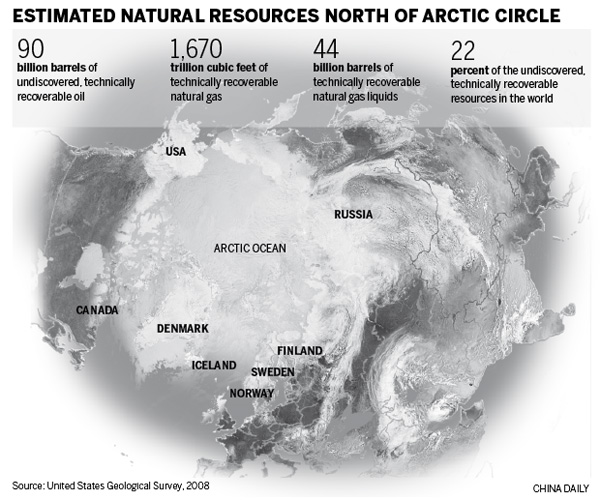

Region expected to be new focus for longtime military powers
|
 |
The United States and Russia have stepped up their efforts to control the Arctic, motivated by strategic considerations, including huge economic interests there, Chinese experts said.
"If we say that the Nordic countries are eyeing up the rich resources and the high shipping value in the Arctic, then the two military powers, the US and Russia, are focusing on the Arctic's value in terms of geopolitical strategy," Song Liwei, researcher with the Frontier Defense College of the PLA, wrote in an article released on Dec 24.
On Dec 10, Russian President Vladimir Putin ordered his Defense Ministry to complete the formation of new military units and infrastructure in the Arctic in 2014 to ensure military security and protect the country's national interests there. He named the task among the government's top priorities.
In September, Moscow announced that it was resuming its permanent military presence in the Arctic by sending warships and nuclear-powered icebreakers to patrol the Northern Sea Route.
Russia has been reinstating its military base in the Novosibirsk Archipelago off the northern Siberian coast since September. The base was abandoned after the dissolution of the Soviet Union. Russia also started restoring its Arctic airfields this year.
Song said the moves are a response to threats posed by the increasing military presence in the region of the US and its allies in the North Atlantic Treaty Organization.
On Nov 22, US Defense Secretary Chuck Hagel announced the Pentagon's first Arctic strategy to guide changes in military planning there.
The US has an extensive presence of around 27,000 troops in Alaska. Hagel also noted that the US military has ski-equipped C-130 transport aircraft and nuclear submarines with decades of operations in polar regions.
Besides, Song said, five of the eight countries in the Arctic are NATO members. Though the US has competing interests with countries such as Canada, he said the NATO allies will temporarily lay aside disputes with each other when confronting other powers.
Song said that nearly half of the Arctic Circle falls within the borders of Russia, indicating the strategic importance of the Arctic to that country. He said Russia will find "its defenses in the north completely exposed (to threats) once waters in central Arctic are controlled by other military powers".
Describing US forces in Alaska as "a major base to contain Russia and control East Asian nations", Song said that if the US loses control over the Arctic, it could face potential threats from multiple directions.
Jiang Chunliang, a researcher at the PLA Academy of Military Science, said that so far Russia is the most influential country in the Arctic.
"To maintain its strategic interests and status" as a super power, the US will strengthen its presence there, he said.
"There is no doubt that the Arctic will be a new focus for the international strategic game."
Jiang pointed to possible conflicts in the Arctic arising from escalating territorial disputes and scrambles for natural resources.
Song Liwei said that due to the huge economic and strategic interests in the Arctic, it would be impossible to sign any kind of agreement banning military activity there, such as was achieved in the Antarctic with the signing of the Antarctic Treaty in 1959.
Countries will have to resort to the United Nations if they want real peace and prosperity in the Arctic, he said.